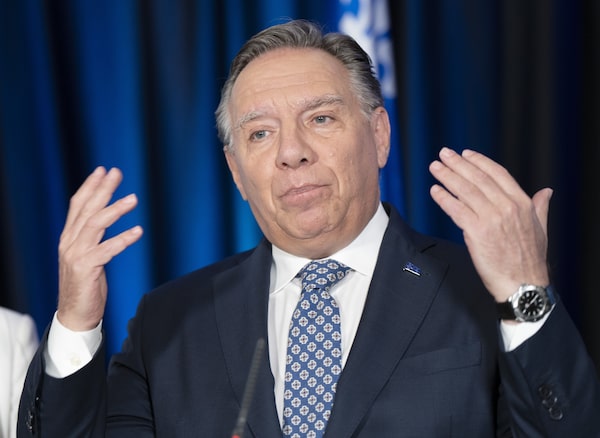
Coalition Avenir Québec Leader François Legault speaks to the media while campaigning in Orford, Que., on Sept. 20. Quebec votes in the provincial election Oct. 3.Ryan Remiorz/The Canadian Press
Quebec voters go to the polls on Oct. 3 in a general election that seems destined to be a cakewalk for the incumbent premier, François Legault. Various polls suggest his Coalition Avenir Québec will win around 90 of the 125 seats in the National Assembly, and could take as many as 105.
So why is Mr. Legault in a bad mood? He has been so shirty since the campaign started that a columnist in La Presse titled his most recent piece, “You Okay, Mr. Premier?”
The CAQ leader has twice had to apologize for intemperate remarks – one time for linking immigration with violence. And he has been “méchamment partisan,” as the columnist, Patrick Lagacé, put it. Nastily partisan.
Opinion: A lacklustre campaign shines a spotlight on François Legault’s shortcomings
It’s odd behaviour for a party leader who has consistently been the province’s most popular, and who, barring a last-minute upset, is on the verge of increasing his majority (the CAQ currently holds 76 seats).
Most campaigning leaders in his position would play it safe by saying as little as possible (see Ford, Doug; elections of 2018 and 2022), sticking to a tight script and maintaining the calm aura of someone above the fray.
Instead, a frowning Mr. Legault has his elbows out. Among other divisive utterances, he has accused Montrealers of looking down on people outside the city, and said Indigenous people don’t want to solve existing problems (the second gaffe he apologized for).
It’s impossible to know what’s going on in the Premier’s mind, but it’s a good guess that he’s feeling pressure on multiple fronts in an election that is a punctuation mark on the evolution of Quebec politics since the 1995 referendum.
The CAQ is competing for seats against four opposition parties that are locked in a dead heat for second place in the popular vote. The poll-aggregating site 338Canada on Wednesday had the federalist Liberal Party at 16 per cent, the right-wing Quebec Conservative Party and the left-wing Quebec Solidaire each at 15 per cent, and the separatist Parti Québécois at 13 per cent.
Any one of those parties can steal votes from the CAQ and potentially lower its seat count. The one most apt to do that is the upstart Quebec Conservative Party; Mr. Legault’s partisan outbursts have likely been designed to protect his right flank.
But boy how things have changed in Quebec. For most of its modern history, the province had a two-party system built on the federalist/separatist dynamic – Liberal versus Parti Québécois. To decide how to vote, all voters had to do was decide where they stood on Quebec’s place in (or out) of Canada. From the 1973 provincial vote through to the 2007 vote, the Liberals and the PQ dominated to such a degree that, over a 34-year span, just 25 seats in the National Assembly were filled by a third party – out of 964 that were up for grabs over eight elections.
The No result in 1995 largely put the separation question to rest. After 2007, the rise and fall of Action Démocratique and the arrival of Québec Solidaire opened a crack in the Liberal/PQ monopoly. Mr. Legault’s CAQ burst it wide open. By shelving all talk of referendums, he has made the Liberals increasingly irrelevant outside of non-francophone Montreal; by aggressively pushing identity politics and French language rights, he has put the PQ on the brink of extinction.
And so now, instead of two big-tent parties filled with candidates from across the left-right spectrum, those tents have torn open and spilled their contents onto the electoral scene – from the dogmatically leftist Québec Solidaire (free contraception, the right to vote at 16) to the anti-vaxxer Quebec Conservative Party (higher speed limits, private health care).
If the polls are correct, six of 10 Quebeckers will vote for one of the four parties trailing the CAQ. Mr. Legault will likely still form a majority government, but could do so with less than 40 per cent of the popular vote.
All of which is a hassle for Mr. Legault. Just 15 years ago, it would have been easier to scare voters back into the safety of federalist/separatist bipolarity; now Quebeckers have a whole range of options. Quebec politics has become multipolar.
As the incumbent, Mr. Legault should be coasting home, confident that there is no alternative to his party for half the province’s voters. But the old Yes/No binary is over, and it’s his party more than any other that has been responsible for ending it. Maybe that’s why he’s so mad.